PHX Sky Train
The PHX Sky Train is an electric people mover at Phoenix Sky Harbor International Airport in Phoenix, Arizona.[1] The initial segment opened to the public on April 8, 2013.[2] The first extension to Terminal 3 opened on December 8, 2014, and the second extension to the Rental Car Center opened on December 20, 2022.[3][4] The 24/7 service operates free of charge, with trains running every 3–5 minutes.[5]
| PHX Sky Train | |||||||||||||||||||||||||||||||||||||||||||||||||||||||||||||||||||||||||||||||||||
|---|---|---|---|---|---|---|---|---|---|---|---|---|---|---|---|---|---|---|---|---|---|---|---|---|---|---|---|---|---|---|---|---|---|---|---|---|---|---|---|---|---|---|---|---|---|---|---|---|---|---|---|---|---|---|---|---|---|---|---|---|---|---|---|---|---|---|---|---|---|---|---|---|---|---|---|---|---|---|---|---|---|---|---|
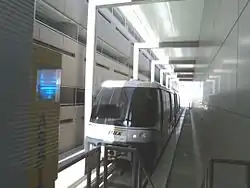 PHX Sky Train | |||||||||||||||||||||||||||||||||||||||||||||||||||||||||||||||||||||||||||||||||||
| Overview | |||||||||||||||||||||||||||||||||||||||||||||||||||||||||||||||||||||||||||||||||||
| Owner | City of Phoenix Aviation Department | ||||||||||||||||||||||||||||||||||||||||||||||||||||||||||||||||||||||||||||||||||
| Locale | Phoenix Sky Harbor International Airport, Phoenix, Arizona | ||||||||||||||||||||||||||||||||||||||||||||||||||||||||||||||||||||||||||||||||||
| Termini |
| ||||||||||||||||||||||||||||||||||||||||||||||||||||||||||||||||||||||||||||||||||
| Stations | 6 | ||||||||||||||||||||||||||||||||||||||||||||||||||||||||||||||||||||||||||||||||||
| Service | |||||||||||||||||||||||||||||||||||||||||||||||||||||||||||||||||||||||||||||||||||
| Type | People mover | ||||||||||||||||||||||||||||||||||||||||||||||||||||||||||||||||||||||||||||||||||
| Operator(s) | Alstom | ||||||||||||||||||||||||||||||||||||||||||||||||||||||||||||||||||||||||||||||||||
| Rolling stock | 42 × Innovia APM 200 | ||||||||||||||||||||||||||||||||||||||||||||||||||||||||||||||||||||||||||||||||||
| History | |||||||||||||||||||||||||||||||||||||||||||||||||||||||||||||||||||||||||||||||||||
| Opened | April 8, 2013 (Phase 1) December 8, 2014 (Phase 1A) December 20, 2022 (Phase 2) | ||||||||||||||||||||||||||||||||||||||||||||||||||||||||||||||||||||||||||||||||||
| Technical | |||||||||||||||||||||||||||||||||||||||||||||||||||||||||||||||||||||||||||||||||||
| Line length | 5 mi (8.0 km) | ||||||||||||||||||||||||||||||||||||||||||||||||||||||||||||||||||||||||||||||||||
| Character | Elevated | ||||||||||||||||||||||||||||||||||||||||||||||||||||||||||||||||||||||||||||||||||
| Highest elevation | 100 feet (30 m) | ||||||||||||||||||||||||||||||||||||||||||||||||||||||||||||||||||||||||||||||||||
| |||||||||||||||||||||||||||||||||||||||||||||||||||||||||||||||||||||||||||||||||||
The PHX Sky Train replaced shuttle buses for transit within the airport property. Inter-terminal shuttle bus service was discontinued on January 15, 2015.[4] Rental Car Center shuttle buses ended with the opening of the extension in 2022.[6]
The PHX Sky Train features a 100-foot-tall (30 m) bridge over Taxiway R, one of three taxiways that connects the north and south runways. This is the first transit bridge in the world to be built over an active taxiway.[7] The bridge is tall enough to allow for Boeing 747 and Airbus A380 aircraft to pass under.[7]
History
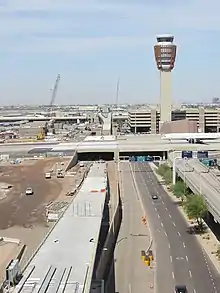
Phase 1 consists of a 1.7 miles (2.7 km) segment [4] constructed between December 2008 and April 2013. It links Terminal 4, the East Economy Parking lot, and the 44th Street/Washington station of the Valley Metro Rail.[2] The guideway runs in a new underpass (below the Union Pacific railroad), past the jet-fuel tank farm, and alongside 44th Street. At an estimated cost of $1.58 billion, Phase 1 opened on April 8, 2013.[2]
Phase 1a, which opened December 8, 2014, extended the train from Terminal 4 to Terminal 3.[4] A 0.25-mile (0.40 km) covered walkway connected the Terminal 3 station with Terminal 2[4] until Terminal 2 closed in February 2020.[8]
Phase 2 opened on December 20, 2022 and extended the Sky Train west from Terminal 3 to the Rental Car Center.[6][3] Funding was approved in October 2016[9] and the extension is projected to cost $700 million.[10] Phase 2 construction completed in mid 2022 and was under testing until its final opening in December.[11] Phase 2 will be fully funded by airline and rental car passenger fees.[10] The 2.5 miles (4.0 km) extension will pass in two cuts underneath future taxiways and Interstate 10.[12]
Future
Phase 2 includes provisions for infill stations to be constructed for a future "West Terminal" (on the site of the West Economy Parking lots) as well as a new ground transportation center to be built just east of 24th Street.[10][12] Both the new terminal and new ground transportation center are unfunded and included in the airport's 20-year Comprehensive Asset Management Plan.[13]
Passenger services
At 44th Street station, domestic passengers can check baggage for flights operated by American Airlines, Southwest Airlines, and United Airlines. Bags must be checked at least 90 minutes prior to the flight's departure time.[4] Once checked, the baggage is delivered in locked containers to the internal baggage-handling systems at Terminal 4. Delivery of the baggage is via secured shuttle-trucks that run approximately every eight minutes.
44th Street also has a passenger drop-off area, cell phone lot,[5] bike racks, and bike lockers.[14] It is also served by routes 1, 32, and 44 of the Valley Metro Bus system.[15] FlixBus boards from the north side of the Sky Train station.
Select airlines also offer kiosks to print boarding passes at the 44th Street/Washington and East Economy Parking stations.[5]
Ridership
Three months after opening, the PHX Sky Train carried about 70,000 people per week, over 40% higher than the design estimates of about 48,000. The busiest days are Thursday and Friday. The busiest times are 5 am-8 am and noon-3 pm[16] In March 2016, average daily ridership was 15,940.[17]
Cumulative ridership hit 1 million in 2013 and hit 10 million in 2015.[10]
Rolling stock
Rolling stock consists of 18 Innovia APM 200 vehicles.[18] Trains generally operating as six 3-car trainsets, although 2-car trainsets are in use during off-peak times. With the opening of Phase 2, Bombardier will deliver 24 additional vehicles.[18]
The system is designed to carry 3,300 passengers per hour per direction. The average speed of the trains was forecasted to be 23 miles per hour (37 km/h), with trainsets capable of reaching 38 miles per hour (61 km/h), making the journey time from the 44th Street to Terminal 4 five minutes, plus an additional two minutes to reach Terminal 3.[19]
This is the third Innovia APM 200 installation following the DFW Skylink and Heathrow Terminal 5 Transit.
Image gallery
Different views of the PHX Sky Train and terminal.
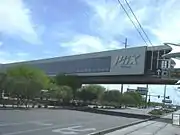 Outside view of the main terminal of the PHX Sky Train.
Outside view of the main terminal of the PHX Sky Train.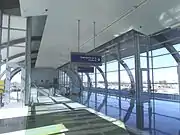 Inside the PHX Sky Train 44th Street Terminal Station.
Inside the PHX Sky Train 44th Street Terminal Station.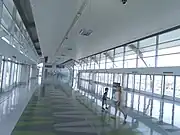 Another view of the 44th Street PHX Sky Train main terminal.
Another view of the 44th Street PHX Sky Train main terminal.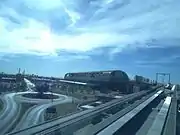 View of the main terminal of the PHX Sky Train from an approaching train.
View of the main terminal of the PHX Sky Train from an approaching train.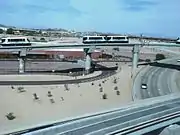 View of the other PHX Sky Trains.
View of the other PHX Sky Trains.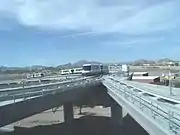 View #2 of the other PHX Sky Trains.
View #2 of the other PHX Sky Trains.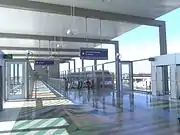 Inside the PHX Sky Train Circulator Shuttle Stop Station.
Inside the PHX Sky Train Circulator Shuttle Stop Station.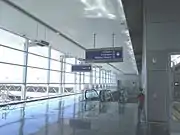 Inside PHX Sky Train Terminal 4 Station.
Inside PHX Sky Train Terminal 4 Station.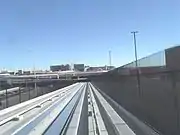 PHX Sky Train rails from terminals four to three.
PHX Sky Train rails from terminals four to three.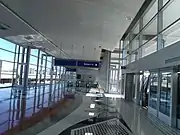 Inside PHX Sky Train Terminal 3 Station.
Inside PHX Sky Train Terminal 3 Station.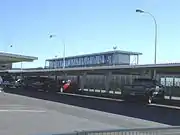 Outside PHX Sky Train Terminal 3 Station
Outside PHX Sky Train Terminal 3 Station
References
- City of Phoenix Sky Harbor Airport. "The Automated Train". Archived from the original on March 12, 2009. Retrieved April 5, 2009.
- Wang, Amy B. "PHX Sky Train opens April 8". AZCentral. Retrieved April 5, 2020.
- "PHX Debuts Final Stage of the PHX Sky Train®: Customers can now easily connect between the Terminals and Rental Car Center". www.phoenix.gov. Retrieved December 21, 2022.
- Gilbertson, Dawn (December 8, 2014). "Sky Harbor Sky Train expands to Terminal 3". The Arizona Republic. Retrieved April 5, 2020.
- "PHX Sky Train". City of Phoenix Aviation Department. Retrieved April 5, 2020.
- "PHX Sky Train® Stage 2". City of Phoenix Aviation Department. Retrieved April 5, 2020.
- Buchholz, Jan (June 4, 2010). "Phx Sky Train taking flight at Sky Harbor airport". Phoenix Business Journal. Retrieved June 6, 2010.
- Yeager, Melissa (February 6, 2020). "Sky Harbor's Terminal 2 is closed. What happens next? Here's what we know". The Arizona Republic. Retrieved April 5, 2020.
- Gilbertson, Dawn (October 21, 2016). "Phoenix OKs update of airport terminal, train". The Arizona Republic. Retrieved April 5, 2020.
- "Phoenix Sky Harbor gives first look at $700M Sky Train extension". KTAR-FM. March 16, 2017. Retrieved April 5, 2020.
- @mayorgallego (December 8, 2022). "Register" (Tweet). Retrieved December 9, 2022 – via Twitter.
- HNTB Corporation (January 2018). "Final Environmental Assessment for Phoenix Sky Harbor International Airport Sky Train Phase 2" (PDF). Retrieved April 5, 2020.
- Ricondo & Associates (2019). "Phoenix Sky Harbor International Airport - Comprehensive Asset Management Plan" (PDF). Retrieved April 5, 2020.
- "Bicycling to Sky Harbor". City of Phoenix Aviation Department. Retrieved April 5, 2020.
- "Valley Metro Rail" (PDF). Valley Metro. October 28, 2019. Retrieved April 5, 2020.
- The Arizona Republic, July 14, 2013, page B5, "Officials: PHX Sky Train may top use estimates
- "Phoenix Sky Harbor Sets Another Passenger Record". skyharbor.com. Retrieved July 19, 2016.
- "Bombardier Wins Contract to Extend People Mover System in Phoenix" (Press release). Berlin: Bombardier Inc. Bombardier Transportation. March 22, 2018. Retrieved April 6, 2020.
- http://www.bombardier.com/en/transportation/media-centre/press-releases/details?docID=0901260d802af38c%5B%5D